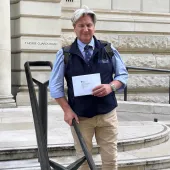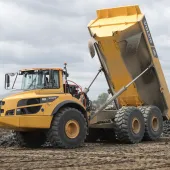BAA Annual Conference 2021

First published in the August 2021 issue of Quarry Management
QM reports on the British Aggregates Association’s 2021 seminar proceedings
The British Aggregates Association (BAA) was back in real life, face-to-face at the Palace Hotel, Buxton, in Derbyshire, for its annual meeting on 21 June. Those who attended agreed it made a pleasant change from Zoom. Some 80 people had registered for the event. They kept a suitable distance from each other and wore masks when they were not seated.
A focus of the event was the mineral industry’s social and environmental impact, with Robert Largan, the Conservative MP for High Peak, who was elected for the first time in 2019, setting the scene to open the meeting. He said his High Peak constituency probably has more quarries than any other and he praised the industry for its contribution to the economy of the area and the country as a whole.
‘Just last week I was working with volunteers on levelling a path around a huge reservoir using aggregate that had been donated by a local quarry, which is a nice symbol of the vital role the industry plays here,’ he said.
Mr Largan said aggregates are essential to how the UK bounces back from the pandemic restrictions of the past 18 months, playing a vital part in the Government’s ambitious plans for infrastructure development. Part of that is the launching of the UK Infrastructure Bank in Leeds, intended to level up and make Britain Green.
He said he is optimistic about the future, including the future of the minerals industry. The Government’s guarantee of lifetime skills would help people see a career path in industries such as quarrying, making sure the skills needed could be recruited.
The MP conceded that the Government was ambitious with its Net Zero target for 2050 and said he hoped it would understand the aggregates industry and work with it. He said there were people in parliament who greatly valued the aggregates industry and wanted to champion it.
He praised government initiatives such as the Super Deduction for capital investments in the year to 1 April 2023, announced in the Spring Budget and introduced in the Finance Act that received Royal Assent ahead of schedule on 10 June. The Super Deduction provides allowances of 130% on most new plant and machinery investments that ordinarily qualify for 18% main-rate writing-down allowances. It also provides a first-year allowance of 50% on most new plant and machinery that ordinarily qualifies for 6% special-rate writing-down allowances.
Mr Largan conceded the Government had borrowed a ‘staggering amount of money’ but described it as the least worst option open to it. The debt would be a burden, but he said it should not stop the Government’s proposed investment in infrastructure because the UK had to be able to attract key industries. In the past, investment had been disproportionately in the South East to the detriment of the rest of the country but now it would be spread throughout the UK.
The questions he was asked included the issue of red diesel being withdrawn from quarry operators, leaving them having to pay more than six times more for their fuel. As a questioner said: ‘It’s supposed to benefit the environment but changing from one diesel to another is not going to help the environment.’
The questioner said the Government should not treat people as children but should come clean about why the tax was increasing. Mr Largan agreed: ‘The government needs to treat people as adults and be much more honest.’
Seminar sessions
Some of these themes were also addressed in two seminar sessions in the afternoon. The first was a health and safety forum led by Viv Russell, the managing director of Longcliffe Quarries who chairs the Institute of Quarrying and the Quarries National Joint Advisory Committee (QNJAC). It was a panel presentation that included Colin Mew, HM Principal Inspector with the Health and Safety Executive (HSE); James Thorne, chief executive of the Institute of Quarrying (IQ); and John Wilkinson, chief executive of the Mineral Products Qualification Council (MPQC).
Colin Mew said that although quarrying is a critical industry, the HSE’s attention had been diverted by the coronavirus pandemic to industries that showed spikes in COVID-19 outbreaks – such as food, particularly meat processing and packaging, and schools.
Quarries were not generally a problem regarding Covid and tackling the virus in quarries had been ‘in the exemplary class’ compared with many industries. There had been only two Covid enforcement notices served on quarries, although both were well deserved because in those cases no effort had been made to prevent the spread of the virus.
He reminded the BAA members that the virus had not gone away, and they should follow government advice.
Looking ahead, he said the HSE would always be involved with quarries because minerals production is one of the last remaining heavy industries in the UK and, as such, has many hazards. Mr Mew’s team is currently investigating three issues involving explosives.
He said the industry had taken a deep breath in 2017 when there were four fatalities, but when that was followed by a flat line ‘we sort of congratulated ourselves and eased off’. But the evidence now is that it is not flat-lining but increasing. He said RIDDOR (Reporting of Injuries, Diseases & Dangerous Occurrences Regulations) incidents had increased.
Last year’s HSE report (in July) on the rate of fatal injuries at work said mining and quarrying normally has around four times the average rate across all industries, broadly similar to that seen in construction, although there had been no deaths in the preceding two years.
However, the HSE says quarrying remains one of the most dangerous industries to work in, with more than 3,500 workers having suffered an injury reportable to the HSE since 2000, 31 of them fatal.
In general, it is the same accidents happening as have always happened, said Mr Mew. They often involve moving heavy vehicles, where a collision with a pedestrian tends to have only one outcome. Removing pedestrians from quarries is the obvious starting point in reducing these accidents, with companies moving down the hierarchy of action from that point. Other dangers include being dragged into machinery, about which QNJAC has produced a useful publication.
Respirable crystalline silica dust, especially in quarries extracting granite, sandstone and slate, which are high silica content rocks, is also something the HSE is focusing on. ‘The industry is a long way off on that,’ said Mr Mew. He thought it was because silicosis and cancer are tomorrow’s problem, typically leading to disability and premature death only later in life. ‘The only sensible advice is to prevent dust at source.’
Mr Mew said he wanted to see quarrying innovate and change. ‘Doing the same things over and over again won’t bring about the change we need to see,’ he said.
QNJAC is developing a suite of audits, which Mr Mew described as a kind of insurance policy. The first is already available, dealing with isolating energy so machines can be turned off quickly. The next will be about pedestrians in quarries. Viv Russell invited operators to contact QNJAC about the audits.
Mr Mew said there had to be an improvement in safety in quarrying. ‘We’re not there by a long shot,’ he told the BAA delegates.
John Wilkinson from MPQC said people who had been trained using the appropriate Vocational Qualifications (VQs) and holding the right cards were not the people involved in accidents. He said the MPQC passport schemes are alive and healthy with the numbers enrolled on the VQs that support them back up to 2019 levels after a Covid lull.
He commended the MP Connect card, which MPQC had developed with the Minerals Product Association (MPA). The aim is that it should eventually replace all the various safety cards drivers and contractors are required to carry. The card provides access to information about the training an individual has received, instantly identifying whether or not they can be allowed on site for the task they are required to carry out.
Mr Wilkinson said there are 20,000 contractors who frequently work in quarries who could benefit from the card, although it would also benefit quarry operators’ own staff. Hanson have committed to getting their entire 3,000 staff MP Connect cards. ‘That’s the future,’ said Mr Wilkinson. ‘That’s what we’re working on at the moment.’
Viv Russell said Longcliffe Quarries had been trialling MP Connect and he was impressed. ‘Certainly, for a small independent business you have a lot of potential there,’ he remarked.
For the benefit of the BAA, Neil Peacock from MPQC and several of his colleagues had demonstrated how MP Connect technology works during the morning session of cameo presentations.
The second seminar was about quarry restoration, landscaping and biodiversity, presented by Andy Littler, who retired as managing director of Longcliffe in 2018 and also worked for Tarmac and Hanson during his career.
He gave an entertaining presentation on a subject he clearly takes seriously, saying biodiversity is ‘absolutely collapsing’ and the quarrying industry can help address that through what it does with the land once it has extracted the minerals. Because of that, he said there was no conflict between his interest in quarrying and his interest in the natural world.
He used several of the quarries he had been involved in restoring as examples of how beneficial they could be to nature when restored thoughtfully. One was Hoe Grange, which he had restored at Longclife. The 7ha site had been turned into calcareous grassland. He showed a slide of it and said, ‘It looks unspectacular, but it isn’t.’
The site has become famous for its butterflies. ‘There are 59 species of butterfly in this country,’ said Mr Littler, ‘and 26 of them are found at Hoe Grange Quarry.’ They include the Large Skipper, Comma and Common Blue, which anything but common. And they live on a variety of equally rare plants that are to be found there, with names such as ladies bedstraw, yarrow, wild marjoram, bird’s-foot trefoil, oxeye daisy, thyme, eyebright and hawkbit. ™
A ‘really big’ dew pond makes the quarry not only look more attractive, but benefits aquatic life, birds and insects. Each year thousands of tadpoles grow into frogs in the pond.
Calcareous grassland is just one of the environments that are becoming rare in the UK. There are others, such as heathland and oak woodland, the mere mention of the creation of which as a result of quarrying can help secure mineral extraction planning permissions and keep the public on the side of quarry companies.
However, Mr Littler said that while restoration is good for publicity, it should be done because it is ‘the right thing to do.’ He added: ‘The drive for excellence in quarry restoration is patchy, I would say. It tends to be a box-ticking exercise.’
He said when a company is seeking planning permission there is a lot of talk about restoration, but it is often forgotten by the time the restoration should be carried out. Planning authorities carried some of the responsibility for that as they were seldom anywhere to be seen when a quarry was closing.
Cameo presentations
There were also six cameo presentations at the BAA annual gathering. Ric Clemmey, managing director of Smiths Bletchington, presented the first on the subject of Net Zero and fuels of the future.
Net Zero aims to limit global warming to 2°C at most, or preferably 1.5°C, by reaching net-zero carbon emissions by 2050 and being halfway to that target by 2030. There were 195 signatories to the Paris Agreement committing to that target, but only 45 of them even hit the first target of submitting a plan for achieving Net Zero.
The UK has passed a law making the achievement of Net Zero a legal requirement, and a target of cutting greenhouse gas emissions by 68% compared with 1990 levels by the end of this decade was presented by the Prime Minister in December.
The targets are not going to be met without the contribution of businesses, including quarrying. Mr Clemmey said Smiths Bletchington have a number of initiatives in place that are already paying dividends financially as well as environmentally, because cutting greenhouse gas emissions tends to cut costs as they reduce the amount of fuel and electricity used.
One of Smiths’ initiatives is using Webfleet telematics and key performance indicators along with Euro VI engines on all their trucks. That offers a considerable fuel saving. The company has also put its drivers through the SAFED driver training programme.
Fuels of the future are likely to be electricity, biofuels and hydrogen, said Mr Clemmey, although he said electric earthmoving equipment currently has a 30% purchase price premium, which makes it hard to justify, especially as the batteries have a limited working time before they need recharging, which takes at least three hours.
With biofuels, compressed natural gas (CNG) saves 35% to 40% fuel costs across the fleet and reduces greenhouse gases by 85%. Hydrogen might scale up to be viable, but Mr Clemmey said it is currently too expensive and needs to overcome issues about its flammability for storage and use.
Next up was Adrian Wilkinson, managing director of QuarryDesign, who spoke about his company’s use of drones in the air and on water, combined with laser scanning, for surveying quarries and mines.
Alan Law, deputy chief executive officer of Natural England, spoke about biodiversity net gain, which requires an approach to development, including quarrying, that ends up with the natural environment in a measurably better state than it was before the development took place. It is about to become written into law under the Town & Country Planning Act in England.
MPQC’s Neil Peacock and his colleagues gave a presentation about MP Connect (as mentioned above) and, to conclude, Chris Rowan from the University of Derby spoke about the training on offer from Derby and how the use of online learning has developed during the Covid pandemic. The University has delivered training 100% online during the pandemic and it will be a permanent aspect of training, although more face-to-face learning will be returning in September now the restrictions have been eased.
- Subscribe to Quarry Management, the monthly journal for the mineral products industry, to read articles before they appear on Agg-Net.com








